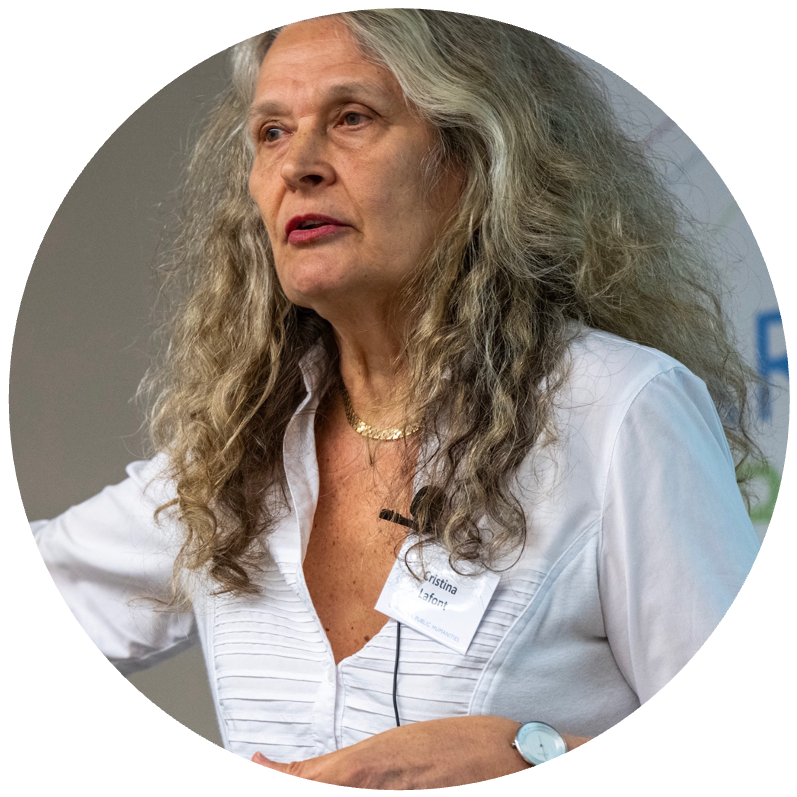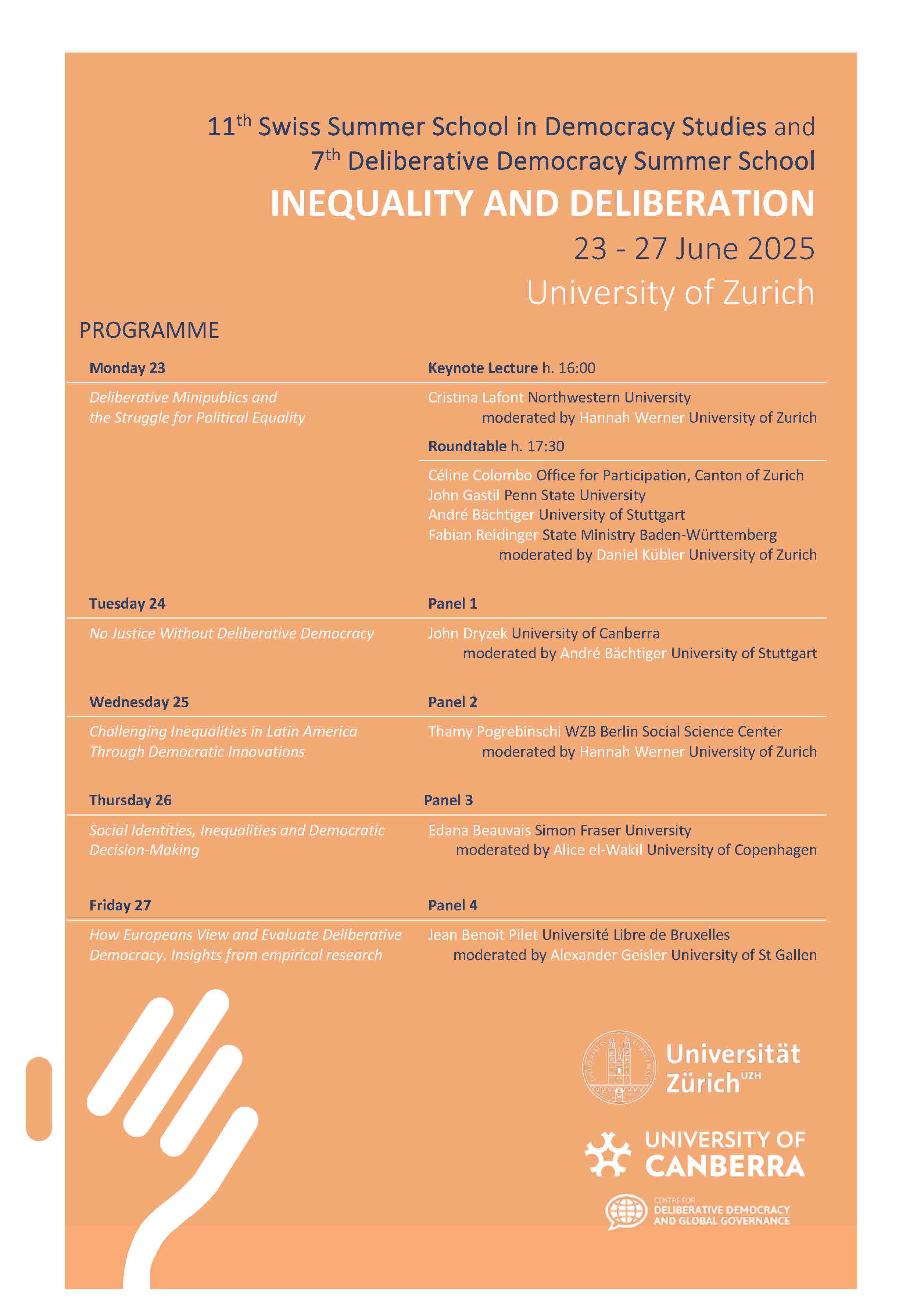Inequality and Deliberation 2025
Description
2025 Zurich INEQUALITY AND DELIBERATION Summer School
In 2025 the “Swiss Summer School in Democracy Studies” and the “Deliberative Democracy Summer School” series join forces to create a premier event for PhD students committed to exploring the depths of deliberative democracy in theory and practice. The 2025 Summer School promises rich insight into deliberation, encompassing a broad array of subfields, including democratic theory, public opinion, political communication, political psychology and more.
Our 2025 Summer School places special emphasis on the interplay between inequality and deliberation, examining not only how inequalities affect deliberation but also how deliberative and participatory tools can be harnessed to address existing disparities.
This broad topic encompasses, in particular but not exclusively, the following themes:
-
Inequalities in deliberation. Focusing on the dynamics of participation and influence within deliberative forums will help answering questions such as: who gets to speak, who is heard, who persuades?
-
Inequalities in perception and support of deliberation and participatory processes. Inequalities also exist in the perception of, the support for, as well as the participation in deliberative events. How do socio-economic, political and cultural factors influence how citizens think of these processes and want to get involved (or not)?
-
Deliberation as a means to address existing inequalities. Existing democratic institutions are known to suffer representation deficits and unequal accessibility. How can deliberative processes contribute to the emancipation or mobilisation of underrepresented groups? Can deliberative forums function as tools of contestation? What impact can they have on policy and the wider political system?
-
Inequality and differences in theory and practice of deliberation. Deliberative democracy has emerged in a Western context, but is increasingly challenged to integrate perspectives from diverse cultural and regional contexts. How can and should we address geographical inequalities in the theory and practice of deliberation?
The 2025 Summer School will feature lectures and interactive sessions led by renowned scholars in the field of deliberative democracy. Participants will have the opportunity to:
-
Engage with leading scholars in the field of deliberative democracy.
-
Collaborate with peers: Network with fellow PhD students from around the world, fostering academic collaborations and intellectual exchanges.
-
Present and receive feedback on research: Share your research with peers and mentors, receiving constructive feedback to enhance your work.
Keynote - Monday 24 June

Deliberative Minipublics and the Struggle for Political Equality
Prof. Cristina Lafont, Northwestern University
The rise of inequality in recent decades has led to an unequal concentration of political power that threatens to wipe out the achievements of centuries of democratic struggles for political equality. This concern explains the appeal of deliberative minipublics such as citizens’ assemblies, citizens' juries, or deliberative polls. By empowering ordinary citizens to participate in political decision-making, these institutions can offer citizens a powerful tool to counteract the oligarchic tendencies of electoral democracies. Many argue that since random selection provides all citizens equal chances to exercise political power, citizens’ assemblies promote political equality better than electing representatives from political elites. This view fuels proposals for conferring legislative authority to minipublics, either to complement or to replace electoral institutions. In this talk, I analyze the interpretation of political equality that guides these proposals and show its undemocratic features. It justifies a form of ‘rule by the few’ that would disempower the citizenry even more. I argue in favor of proposals for institutionalizing minipublics that would empower the citizenry and thus improve democratic equality.
Panel 1 - Tuesday 24 June

No Justice Without Deliberative Democracy
Prof. John Dryzek, University of Canberra
Inequality matters to the degree it is unjust. At the micro level, deliberation has been charged with perpetuating unjust social inequalities, reflected in unequal communicative capacities across individuals. At the macro level, deliberative processes could be complicit in the legitimation of an unjust political economy. Against such critics, I argue that epistemic injustice can be effectively remediated within deliberative forums. Further, at both micro and macro-systemic levels, effective and inclusive deliberation is needed to tell us what justice should mean in particular contexts. The kind of agency necessary here can only flourish under deliberative democratic conditions, such that there can be no justice without deliberative democracy. The argument can be illustrated in relation to climate justice, the Sustainable Development Goals, vaccine justice, genome editing justice, and an alternative to effective altruism.
Panel 2 - Wednesday 25 June

Challenging Inequalities in Latin America Through Democratic Innovations
Prof. Thamy Pogrebinschi, Berlin Social Science Center
Inequality is one of the most pervasive challenges to democracy. It erodes political inclusion, weakens accountability, undermines the rule of law, and perpetuates social injustices. Yet, while socioeconomic disparities restrict opportunities for meaningful citizen participation, democratic innovations emerge as a response to such problems, aiming to enhance democracy by improving social equality and political inclusion. This lecture will explore how democratic innovations can address inequality, focusing on Latin America, one of the most unequal regions in the world. Using a problem-driven approach to democratic innovations, we will examine concrete cases of participatory institutions and processes designed to tackle income and territorial inequalities, unequal access to goods and services, and discrimination based on gender, race, ethnicity, and age.
Panel 3 - Thursday 26 June

Social Identities, Inequalities, and Democratic Decision-Making
Prof. Edana Beauvais, Simon Fraser University
My present work builds on the notion that we need to rethink the nature and location of collective action due to not only changing modes of production, technology, and communication, but also the rise in identity politics and other postmodern features of political culture (Warren 2001). I consider how the socio-demographic composition of social and political associations—including democratic innovations—impact their ability to achieve democratic aims. By “democratic aims,” I mean outcomes related to inclusion, outcomes related to learning and opinion change, and outcomes required for democratic legitimacy—such as representing difference and coordinating cooperation. Specifically, I consider whether associations need to promote cross-cutting interactions to achieve democratic outcomes or whether, and under what conditions, exclusive identity-based associations—such as exclusive racial-, gender-, or sexuality-based associations —can promote democratic aims. Existing work in democratic theory does not hold high hope for exclusive identity-based associations (Warren 2001). In my present work, I make the case that the positionality of identity-based group matters for whether these groups have higher or lower potential for achieving democratic outcomes.Drawing on feminist theories of intersectionality, Iris Young's concept of seriality, and bellhooks' theories of centering the margins helps us see that, when it comes to constituting identity groups, there is more flexibility in terms of exit than we might think, what it means to couch something in terms of common interests varies depending on context, and identity goals can promote cooperation and coordination, thus deepening democratic legitimacy. That is, even the most basic, ascriptive identity groups are not merely given, they are taken up and enacted, and how and why they are taken up and enacted matters for their democratic potential
Panel 4 - Friday 27 June

How Europeans View and Evaluate Deliberative Democracy. Insights from empirical research
Prof. Jean Benoit Pilet, Université Libre de Bruxelles
While we know that citizens assemblies and other deliberative forums are spreading across Europe, we still know relatively little about how they are perceived by the wider public. In this lesson, we will present and discuss the burgeoning literature on public support for deliberative democracy. In particular, we will explore three elements: (1) how much support there is among Europeans for a greater use of mini-publics, (2) what are the main traits of citizens who support (vs. those who oppose) a deliberative turn in contemporary democracies, and (3) under what conditions mini-publics seem to generate greater public support.
Instructors
Morning seminars and afternoon workshops
|
Cristina Lafont |
Northwestern University |
|
John Dryzek |
University of Canberra |
|
Thamy Pogrebinschi |
WZB Berlin Social Science Center |
|
Edana Beauvais |
Simon Fraser University |
|
Jean Benoit Pilet |
Université Libre de Bruxelles |
|
Alice el-Wakil |
University of Copenhagen |
|
Alexander Geissler |
University of St. Gallen |
|
Nenad Stojanović |
University of Geneva |
|
Francesco Veri |
University of Zurich |
|
John Gastil |
Penn State University |
|
André Bächtiger |
University of Stuttgart |
| Marco Steenbergen | University of Zurich |
|
Simon Niemeyer |
University of Canberra |
|
Daniel Kübler |
University of Zurich |
|
Hannah Werner |
University of Zurich |



